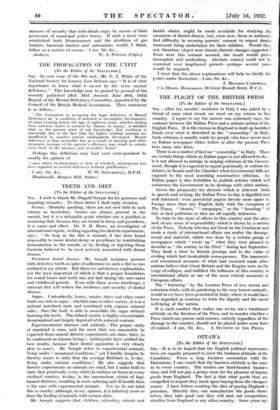THE PLIGHT OF THE BRITISH PRESS [To the Editor of
the SPECTATOR.] SIR,—After ten months' residence in Italy I was asked by a friend of mine what struck me most on my return to this country. I regret to say the answer was extremely easy, the contrast between the Italian Press and a certain section of the English Press. It is the custom in England to hold up horrified hands over what is deseribed as the " censorship " in Italy. Such criticism is usually made by people who have never read an Italian newspaper either before or after the present Press laws came into force.
There is as a matter of fact no " censorship " in Italy. There are certain things which an Italian paper is not allowed to do— it is not allowed to indulge in carping criticism of the Govern- ment, though it is expected to report practically in extenso the debates in Senate and the Chamber when Government bills'are exposed to the most searching constructive criticism. An Italian paper is also forbidden to publish articles which will embarrass the Government in its dealings with other nations.
Given the propensity for rhetoric which is inherent both in speech and writing, the Italian Press to-day is dignified and well informed : even provincial papers devote more space to foreign news than any English daily with the exception of The Times. " Stunts," " campaigns," or the " boosting " of this or that politician or idea are all equally unknown.
To turn to the state of affairs in this country and the utter lack of any sense of responsibility which is shown by a section of the Press. Nobody who has not lived on the Continent and made a study of international affairs can realise the damage, moral and material, which was done by a certain group of newspapers which " wrote up " what they were pleased to describe as " the mutiny in the Fleet " during last September. They dealt a blow to British prestige and to the value of sterling which had incalculable eonsequences. The inaccurate and sensational accounts of what had occurred made other nations believe that Great Britain and the Empire were on the verge of collapse, and nullified the influence of this country in international affairs at one of the most critical moments in European affairs.
The " featuring" by the London Press of two recent and notorious trials, with its pandering to the very lowest curiosity, would never have been permitted in Italy, where it would have been regarded as contrary to both the dignity and the social well-being of the nation.
It is such conduct that makes one revise one's traditional attitude on the freedom of the Press and to wonder whether a Press which can pursue such courses, entirely regardless of the damage to the country, should not be placed under some form of control.—I am, Sir, &c., A STUDENT OF THE PRESS.


































 Previous page
Previous page